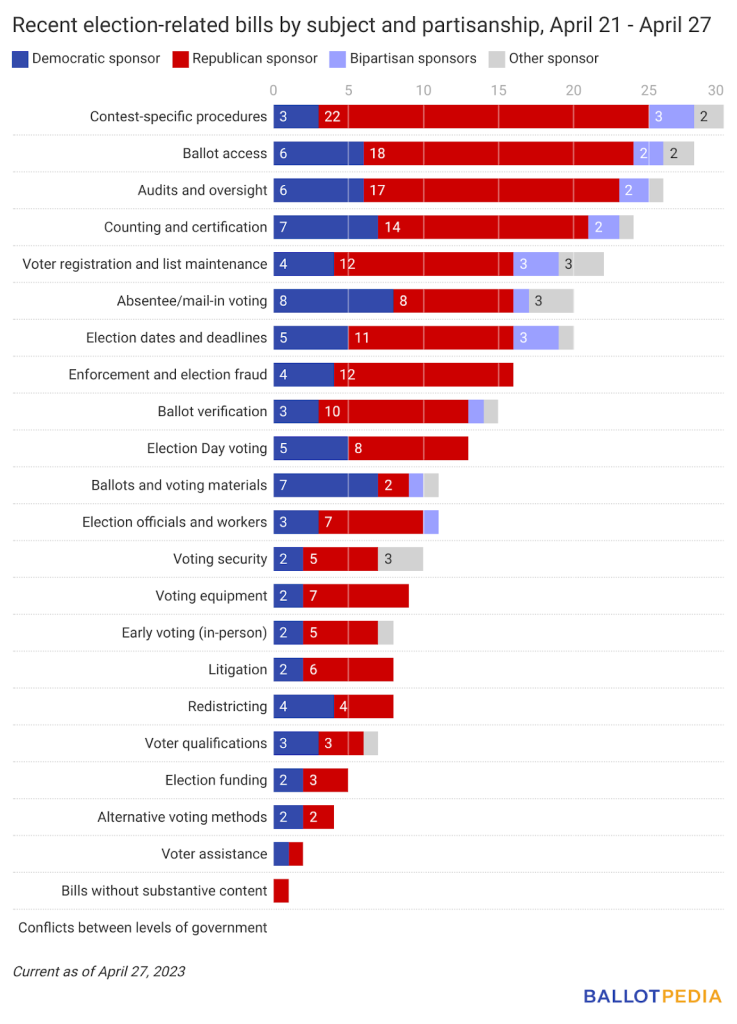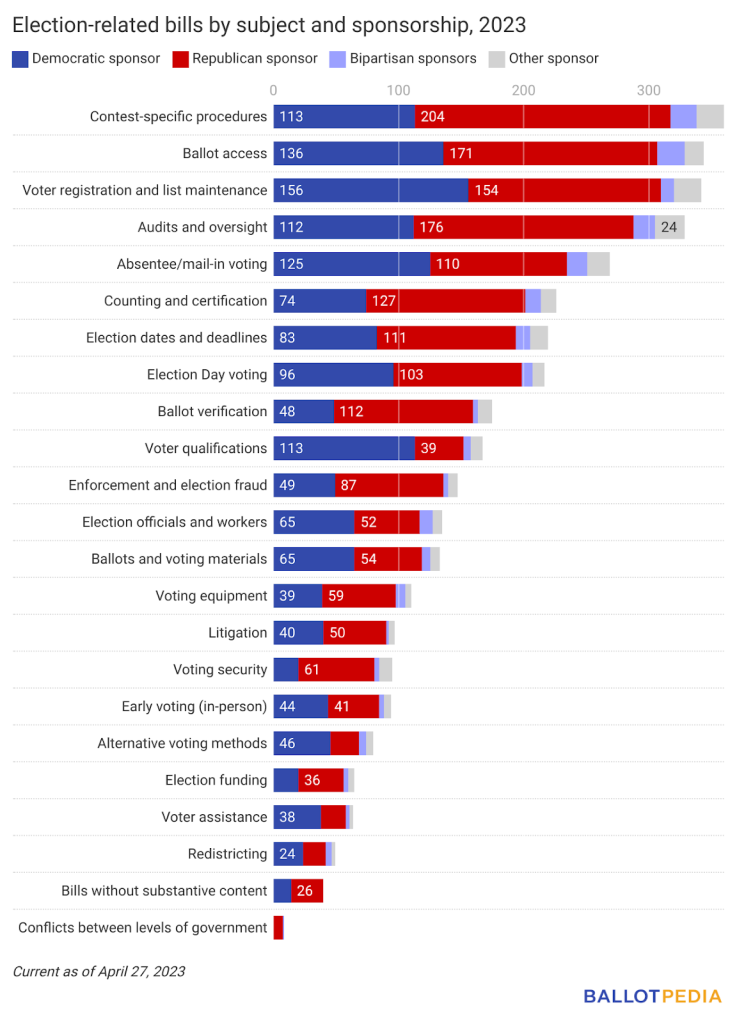Welcome to The Ballot Bulletin: Ballotpedia’s Weekly Digest on Election Administration. Every Friday, we deliver the latest updates on election policy around the country, including legislative activity, nationwide trends, and recent news.
In today's issue, you'll find:
- Legislative activity: About the bills acted on this week and a big-picture look at all the bills we have tracked this year.
- Recent news: Noteworthy developments in election policy at the federal, state, and local levels, including litigation and ballot measures.
Legislative activity
State legislatures acted on 158 election-related bills from April 21 to April 27, down from 182 bills the previous week. Of these, 75 either passed one chamber, passed both chambers, were enacted, or were defeated.
Highlights:
- These 158 bills represent 6.5% of the 2,433 election-related bills introduced in 2023. At this point in 2022, 111 bills had been acted on in some way in the past week, and we were tracking 2,508 election-related bills, 3.1% more than this year.
- Of the 75 bills moving past the introductory stage, 10 (13.3%) are in Democratic trifecta states, 52 (69.3%) are in Republican trifecta states, and 13 (17.3%) are in states with divided governments.
- The bill topics with the most legislative activity this week were contest-specific procedures (30), ballot access (28), audits and oversight (26), counting and certification (24), and voter registration and list maintenance (22). Contest-specific procedures refers to primary systems, municipal election procedures, recall elections, special election procedures, and other systems unique to a particular election type.
Recent activity and status changes
Of all election-related bills in state legislatures in 2023:
- 86 have been enacted (+5 from last week)
- 64 passed both chambers (+18)
- 186 passed one chamber (+20)
- 2 advanced from committee (No change)
- 2,031 have been introduced (-9)
- 64 are dead (No change)

Enacted bills
States have enacted 86 election-related bills in 2023, three more than the 83 bills states had enacted at this point in 2022. Of these 86 bills, Democrats sponsored 16 (18.6%), Republicans sponsored 47 (54.7%), and 16 (18.6%) had bipartisan sponsorship. Committees or legislators with a party affiliation other than Republican or Democrat sponsored the remaining bills. To see all bills approved this year, click here.

Five bills were enacted this past week, all in Maryland.
Maryland (Democratic trifecta)
- MD HB410: Elections - Polling Place Plan, Prohibited Acts, and 2024 Primary Election Date
- MD SB863: State Administrator of Elections - Removal From Office
- MD SB379: Election Law - Ballot Issuance, Processing, and Reporting Procedures and 2024 Primary Date
- MD HB1200: Elections - Election Judges - Minimum Compensation
- MD HB535: Election Law - Ballot Issuance, Processing, and Reporting Procedures and 2024 Primary Date
Bills that passed both chambers
Sixty-four bills have passed both chambers (but have not yet been enacted) in 2023. These bills represent 168.4% of the 38 bills that had passed both chambers at this point in 2022. To see all bills that have currently passed both chambers, click here.
Active bills that passed both chambers since April 21, with their official titles, are below.
Indiana (Republican trifecta)
- IN HB1336: Various election law matters.
- IN HB1335: Various election law matters.
- IN HB1334: Absentee voting.
Kansas (divided government)
- KS SB221: Amending statutes concerning election officials, election crimes and election procedures.
- KS HB2087: Directing political parties to have procedures for the selection of presidential electors.
- KS HB2053: Senate Substitute for HB 2053 by Committee on Federal and State Affairs - Providing for a presidential preference primary election on March 19, 2024, and establishing voter registration and voting procedures for such election.
- KS SB208: House Substitute for SB 208 by Committee on Elections - Amending provisions relating to the governmental ethics commission's authority to investigate and enforce the campaign finance act and limitations on the receipt and expenditure of contributions.
Montana (Republican trifecta)
- MT SB61: Clarify definition of election officials
- MT SB93: Generally revising ballot issues
- MT SB254: Generally revise election laws
- MT SB117: Prohibiting use of certain funds for conducting an election
- MT SB143: Allow for a referendum to terminate citizen initiated zoning district
- MT HB543: Revise laws for ballot wording for bonds and levies
- MT HB335: Generally revise election laws related to absentee ballot list procedures
- MT SB197: Revise and extend post-election audit process
- MT HB598: Prohibit use of ranked-choice voting methods
- MT HB172: Revise laws related to post-election audits
Oklahoma (Republican trifecta)
- OK SB481: Security of election officials; prohibiting certain actions towards election officials. Effective date. Emergency.
South Carolina (Republican trifecta)
- SC H4216: Spartanburg School District 7, reapportionment
Tennessee (Republican trifecta)
- TN HB0817: AN ACT to amend Tennessee Code Annotated, Title 2 and Title 6, relative to local elections.
- TN SB0854: AN ACT to amend Tennessee Code Annotated, Title 2, Chapter 17 and Title 2, Chapter 8, relative to elections.
- TN SB1007: AN ACT to amend Tennessee Code Annotated, Title 2, relative to elections.
Defeated bills
Sixty-four bills have been defeated in committee or by a floor vote in 2023. These bills represent 36.4% of the 176 bills that were defeated at this point in 2022. To see all bills that have been defeated in 2023, click here.
No bills have been defeated since April 21.
Recent activity by topic and sponsorship
The chart below shows the topics of the bills state legislatures acted on since April 21. Click here to see a full list of bill categories and their definitions.

* Note: Contest-specific procedures refers to primary systems, municipal election procedures, recall elections, special election procedures, and other systems unique to a particular election type.
All 2023 bills by topic and sponsorship
The chart below shows the topics of a sample of the 2,433 bills we have tracked this year. Note that the sums of the numbers listed do not equal the total number of bills because some bills deal with multiple topics.

Enacted bills by topic and sponsorship, 2022 vs. 2023

Recent activity by state and trifecta status
Forty (34.1%) of the 158 bills with activity this week are in Democratic trifecta states, 92 (58.2%) are in Republican trifecta states, and 26 (7.7%) are in states with divided governments.
Of the 111 bills with activity during this week in 2022, 51 (46%) were in states with Democratic trifectas, 32 (28.8%) were in states with Republican trifectas, and 28 (25.2%) were in states with divided governments.
The map below shows election-related bills acted on in the past week by state trifecta status.

All 2023 bills by state and trifecta status
Of the total bills introduced in 2023, 1,055 (43.3%) are in states with Democratic trifectas, 1,123 (46.1%) are in states with Republican trifectas, and 256 (10.5%) are in states with divided governments.
Texas legislators have introduced the most election-related bills this year. Texas holds legislative sessions in odd years only, and so had no activity in 2022. New York was the most active state at this point in 2022. South Dakota has enacted the most bills this year. In 2022, New York and California had enacted the most bills at this point.
The map below shows the number of election-related bills introduced by state in 2023 by state trifecta status.

Recent news
Utah among top states enacting election legislation for second consecutive year
For the second year in a row, Utah is among the top three states that have enacted election-related legislation. Utah lawmakers enacted 12 of the 29 election-related bills (41.4%) introduced in 2023, and nine of 18 bills in 2022 (50%). Republicans were the sole sponsors of all but two of these bills. Utah is a Republican trifecta, and the only state to hold a trifecta status unchanged between 1992 and 2023. No other state was in the top three in both years. In 2022, Colorado (50%) and Connecticut (50%), both Democratic trifectas, rounded out the top three. The other two states enacting the most election-related legislation so far this year are Arkansas (45%) and South Dakota (42.1%), both of which are also Republican trifecta states. The most common topic of enacted bills in these states is counting and canvassing procedures (six bills), followed by audits (five bills).
Voting rights groups sue over Georgia election bill
Voting rights groups, including the Southern Poverty Law Center (SPLC) and the American Civil Liberties Union (ACLU) of Georgia, filed a motion to halt a Georgia elections bill in the United States District Court for the Northern District of Georgia on April 24. The bill, SB202, prohibits anyone except for poll workers from distributing food or drinks at polling places within 150 feet of voters waiting in line. The bill also requires voters to provide a photo ID in order to cast absentee ballots and limits the number of absentee ballot drop boxes. Poy Winichakul, an attorney for the SPLC, said, "There can be no reason for denying food or water to people in long polling lines, other than trying to prevent them from exercising their freedom to vote. These barriers to voting must be removed so all Georgians can have a voice to advocate for their communities in the crucial 2024 elections." The SPLC and other groups filed a similar motion in May of 2022, which the district court did not grant. In a 2022 hearing on the first legal challenge, lawyers for state said the bill would prevent illegal campaigning and make poll workers' jobs easier. Attorney Gene Schaerr said, "It’s a bright line rule. No one has to decide how much is too much."
Arizona appeals court issues ruling in ballot auditing lawsuit
The Arizona Court of Appeals upheld a lower court's ruling ordering the Arizona Republican Party to pay attorneys’ fees and other costs in a lawsuit challenging Maricpoa County's ballot auditing procedures during the 2020 election. In the original 2020 lawsuit, the party's attorneys argued that county officials incorrectly selected ballots for auditing from voting centers rather than by precinct. Writing for the court, Judge Michael J. Brown, an appointee of former Gov. Janet Napolitano (D), said the Arizona Republican Party "cites no authority suggesting that general allegations about public mistrust and the legitimacy of the election, to the extent they could be relevant in a proper election-related lawsuit, provided any legal justification for filing its claims here." A spokeswoman for the party said in a statement that, "We were surprised by the court’s decision, and will be speaking with legal counsel soon to discuss the best path forward. We are committed to ensuring that elections are fair and accurate."
Montana Senate tables bill to change primary elections
On April 19, a Montana House committee tabled a bill that would change how the state's U.S. Senate primaries are conducted. SB566 would create a top-two primary for state's U.S. Senate seats in which the two candidates with the most votes would advance to the general election, regardless of party. Eleven of the House State Administration Committee's 12 Republican members and all six Democratic members voted to table the bill. The bill's sponsor, Sen. Greg Hertz (R), said, “It always bothers me that sometimes our statewide elected officials don’t end up with the majority vote." State Rep. Kelly Kortum (D) said the bill was "an irresponsible way to change Montana’s election laws," adding that, "A broad coalition of Republicans, Democrats, Independents, Libertarians, and others across Montana publicly spoke out against the bill." State legislators across the country have introduced more than 90 bills dealing with primary election systems in 2023, enacting one and defeating five.

